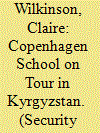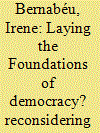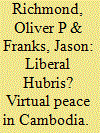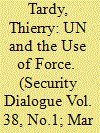|
|
|
Sort Order |
|
|
|
Items / Page
|
|
|
|
|
|
|
| Srl | Item |
| 1 |
ID:
077204


|
|
|
|
|
| Publication |
2007.
|
| Summary/Abstract |
The article argues that the theoretical framework presented by the Copenhagen School is currently unsuited to empirical studies outside the West owing to two factors. First, the presence of the 'Westphalian straitjacket' has prevented explicit interrogation of the normative concepts underlying the framework: there is a presumption that European understandings of society and the state are universal. Second, the centrality of the speech-act for securitization to the exclusion of other forms of expression, such as physical action, results in the theoretical framework producing a Westernized description of a given situation. The extent to which these factors limit the utility of the concepts of securitization and societal security in a non-Western setting is illustrated through the case of the overthrow of the government in Kyrgyzstan in March 2005. This example forms an empirical critique to highlight how theoretical shortcomings result in a simplified and Westernized description of the situation that does not take into account the specific local socio-political context. The article concludes that if the Copenhagen School's theoretical framework is to be considered suitable for universal application, future theoretical developments must explicitly address the issues discussed to enable progress in escaping International Relations' Westphalian straitjacket
|
|
|
|
|
|
|
|
|
|
|
|
|
|
|
|
| 2 |
ID:
077207


|
|
|
|
|
| Publication |
2007.
|
| Summary/Abstract |
This article explores the relationship between security sector reform (SSR) and democratic transition in post-conflict contexts, drawing on Kosovo as a case. The study focuses in particular on the justice sector in Kosovo, reviewing the ways in which security, the rule of law and democracy have been intertwined. The article first outlines the context of the international mission in Kosovo, before proceeding to consider how the objectives, needs and constraints of different actors have influenced the reform of the security institutions and the democratization process. Thereafter, it discusses the concepts of SSR and democratic transition, briefly reviewing the UN discourse and record in SSR-related activities. Finally, it explores the interplay of these factors in the Kosovo justice sector reform process. The main finding stemming from this analysis is that not only do SSR and democratization agendas interfere with each other, but measures adopted to cope with security challenges related to the post-conflict context can also affect them both. Furthermore, this finding demonstrates that a well-developed UN theoretical discourse is still not matched by the reality of UN practices in the field
|
|
|
|
|
|
|
|
|
|
|
|
|
|
|
|
| 3 |
ID:
077205


|
|
|
|
|
| Publication |
2007.
|
| Summary/Abstract |
The article examines the nature of the peace that exists in Cambodia by critiquing the 'liberal peace' framework. The authors claim that, despite the best efforts of international donors and the NGO community, liberal peacebuilding in Cambodia has so far failed in many of its key aims. The liberal peacebuilding project in Cambodia has been modified by a combination of local political, economic and social dynamics, international failings, and the broader theoretical failings of the liberal peacebuilding process. There have been some important successes, but serious doubts remain as to whether this project has been or can be successful, not least because of the ontological problem of whether the liberal peace is at all transferable. This raises the question of what type of peace has actually been built. The authors argue that the result of international efforts so far is little more than a virtual liberal peace
|
|
|
|
|
|
|
|
|
|
|
|
|
|
|
|
| 4 |
ID:
077206


|
|
|
|
|
| Publication |
2007.
|
| Summary/Abstract |
This article addresses the issue of the interaction between the UN and the concept of the use of force, arguing that the UN has, since its inception, suffered from the gap between the theoretical aspects of its mandate regarding the use of force and the reality of international politics. The first part looks at the dual nature of the UN, being the product of both a liberal and a realist approach to international relations, and the way that nature constrains the organization in using force. The second part illustrates the article's theme using the example of peace operations, which are at the heart of the conceptual ambiguity of the UN relationship with the use of force. In the early 1990s, the use of force within peace operations characterized the changing nature of such operations, as well as the gap between idealized peace-keeping and the reality of the field. Finally, the third part sheds light on the way the UN has dealt with recent developments regarding the use of force. Looking at the 'responsibility to protect' and at the Iraq case, it analyses the increasing difficulty for the UN of squaring the principles of its Charter with the evolutions of norms of interventions and threats to international and individual security.
|
|
|
|
|
|
|
|
|
|
|
|
|
|
|
|
|
|
|
|
|